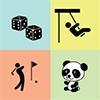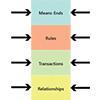Design Course
Designing for Children - Play and Learn
Play and Learn
by
Play has been recognised as one of the most significant activities in childhood, playing a critical role in the development of children. While play manifests in different forms as the child grows, its definition remains elusive, often being seen as a uni-dimensional concept in the past. A contemporary definition of play does not simply look at the absence or presence of play but rather looks at a continuum or gradability using the handle of ‘playfulness’, such that an activity could be more or less playful depending on a set of dispositional characteristics which are present like intrinsic motivation, non-literality, means v/s ends, active engagement, positive affect, etc. Moreover, recent definitions have conceptualized playfulness as a dynamic entity which is dependent on the context. Thus, understanding playfulness as context-dependent and multi-dimensional, allows for the possibility of design interventions to increase the playfulness in an activity/artefact.
Having been extensively studied from a long time, there are a plethora of play theories and classifications. Some of these selected theories and classifications are briefly discussed below, which are interesting from the point of view of using them in design applications.






